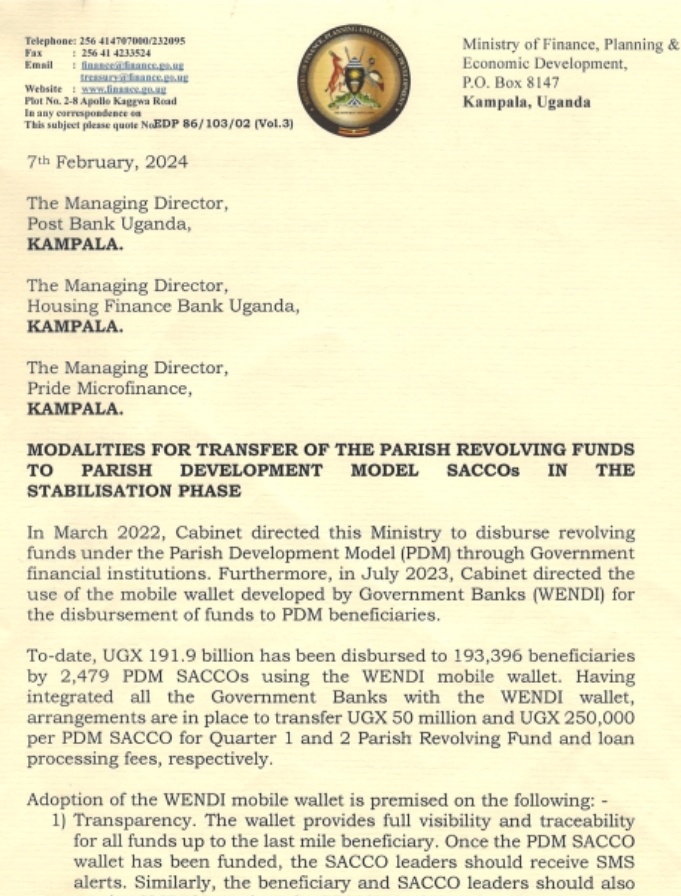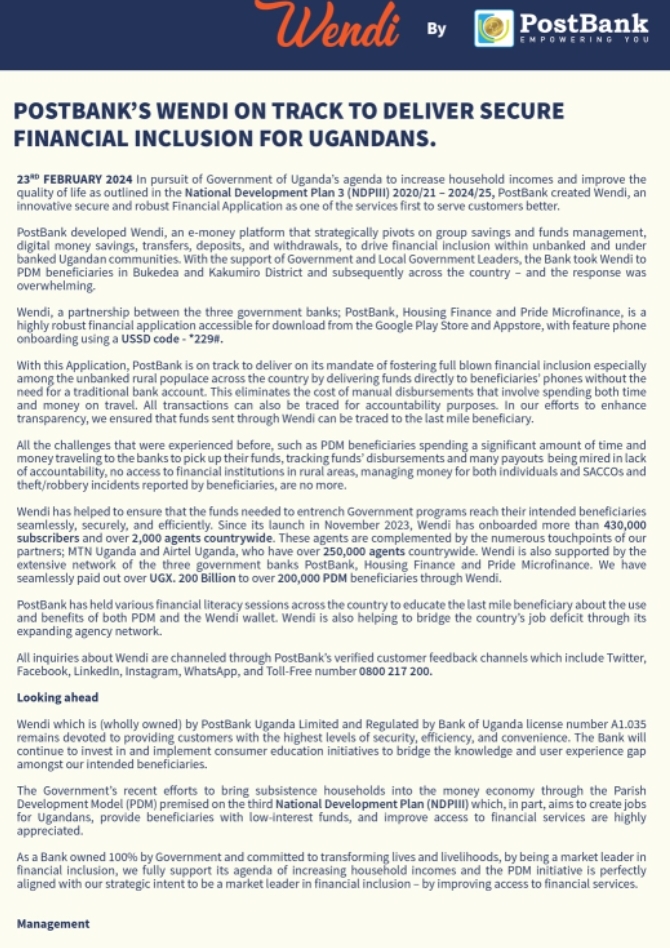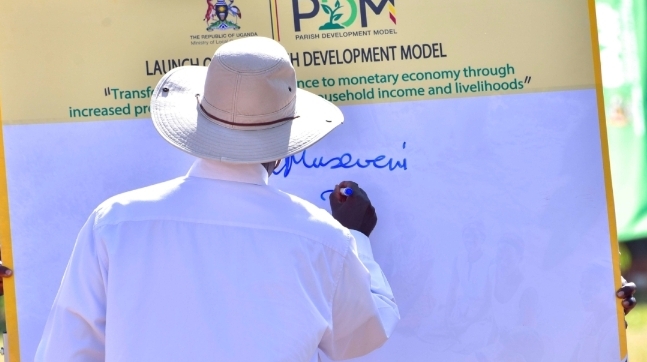The crisis at the Post Bank has deepened as the bosses are entangled in meetings with Finance Ministry technocrats to defend the suspicious mobile wallet, Wendi, that is likely to dent President Museveni’s agenda to increase household incomes and improve the quality of life through Parish Development Model.
Whereas the architects of Wendi seem to be convinced that their infant and not properly tested Mobile Wallet with only 430,000 subscribers (including PDM non-beneficiaries and hackers/scammers) think the scheme can work effectively, the finance experts have pointed out the system’s loopholes. The 2000 Wendi agents Post Bank prides themselves on across the country cannot in any way transact and satisfy 10594 identified parishes.
In order to disburse the first phase batch effectively, the PDM supervisors in conjunction with Ministry of Finance technocrats reached out to the beneficiaries across the country using 13 banks that include dfcu, Opportunity Bank, DTB, Equity Bank, Finance Trust Bank, Bank of Africa, Post Bank, Housing Finance Bank and Pride Microfinance Bank. However, out of blue, the technocrats at the Finance Ministry changed their mind and connived with individuals at Post Bank to adopt a new mobile wallet, Wendi.
The representation of the 3 government financial institutions with only 109 branches cannot be compared to the networks of the 13 banks that have over 700 branches as well thousands of agents countrywide. The payment of Shs200bn to 20,000 beneficiaries as indicated in the Post Bank’s release last week is not accurate since some of the funds reportedly went to fictitious beneficiaries as evidenced in the piloted districts of Sironko, Kampala, Bugiri and Kaliro where the government has already registered a financial loss of close to Shs300m.
Relatedly, the Wendi system which came with the booting of the 10 banks which were used in the first phase will automatically render a good number of financially trained ‘Bazzukulu’ jobless.
Last week, Post Bank confirmed developing the mobile wallet despite reports that the software was clandestinely designed by Chinese gurus whose address is hitherto obscure.
And in order to silence the political cohorts and operate smoothly despite hiccups, the Wendi master planners at finance ministry and Post Bank strategically launched its operations in the districts of Kakumiro (Prime Minister Robinnah Nabanja’s constituency) and Bukedea (Speaker Anita Among’s constituency).
Although the Post Bank bosses claim that Wendi is an innovative, secure and robust Financial Application to serve customers better, the financial seers think contrary.
Post Bank imposed their generated mobile wallet on the independent (Housing Finance and Pride Microfinance) banks claiming they are in the partnership but the implementation is wanting since there are no feedback channels from the Sacco Chairpersons and beneficiaries to the latter banks.
In the superficial media release last week, Post bank directed that all inquiries about Wendi be channeled through Post Bank’s verified customer feedback channels which include Twitter, Facebook, Linkedin, Instagram, WhatsApp, and Toll-Free number 0800 217 200. One wonders the motive and how Post Bank will answer queries on behalf of the other independent banks. Besides, 90 percent PDM beneficiaries are computer illiterate and don’t even own smartphones yet the bank’s communication channel requires them to be tech savvy.
The expert finance seers think this is very cosmetic and detached from the reality on the ground.
The cancellation of the old tested financial channels where the beneficiaries would access the PDM money on the supervised bank accounts and introduction of e-banking itself restricts the recipients to only one option. The beneficiaries will be spending much time since Wendi has few or no agents at all in most areas including Kakumiro where it was launched.
Post Bank’s pattern-ship with other mobile wallets (MTN, Airtel) is very expensive and warrants double charges. After Wendi charging its transaction fee of Shs3750 – Shs4000 from every beneficially, the other mobile wallets will also charge Shs25,000 to make it Shs29,000 and this will be deducted from Shs1m contrary to the presidential motive.Previously the cost was less in the banks or not there at all for the beneficiaries who received cash.
In the new Wendi system, group saving is very difficult since all the transactions are done on the financially illiterate Sacco chairperson’s phone. There is no trust at all and the chairperson can easily divert the funds to other businesses or to the beneficiaries of his choice.
The new Wendi digital system is likely to exclude 39 percent of the PDM beneficiaries who have just been introduced to the money economy. Statistically only 21 – 25 million people (including non-PDM beneficiaries) own mobile phones and some areas in Uganda have poor or no networks at all. This is a big challenge within the mandate of Wendi to deliver money to the target population and one wonders how the subsistence beneficiaries with no mobile phones but possess national IDs will access their money. The issue of poor phone networks, no float, no Wendi agents in some areas may force the beneficiaries to travel longer distances. Evidently there is only one Post Bank based in Kotido in Karamoja region, this means the Sacco executive leaders and some beneficiaries with complaints will cross various districts bypassing other banks to benefit from the government initiative.
The motive of excluding the local leaders is hitherto questionable. The February 7, 2024 letter signed by the PSST Ramathan Ggobi to the three selected banks directed that all funds received by the banks be transferred to SACCO Wendi Accounts which are controlled by SACCO leaders and this MUST be done within 24hours of receipt. By empowering the SACCO leaders to get funds under their Wendi Accounts, the FIs and the Local Government have no control over what actions or errors the SACCO leaders take and this is likely to put the government at a risk of incurring heavy losses.
Whereas the accounting officers, RDCs, OWC officers, DISOs, Parish Development Committee (PDC) members and elected leaders at all levels were previously working together to enforce compliance with the PDM conditions, the PSST’s letter trashes their relevance and gives all the authority and responsivity to the less trained and illiterate SACCO leaders. This disbursement method reflects a potential conflict of interest with a hidden agenda.
Besides, it creates room for the THIRD PARTY contrary to the presidential directive. The banks receiving money on SUSPENSE ACCOUNTS (3rd party) for only 24 hours and transfer to the Sacco Chairperson’s account leaves no room for clear traceability and accountability since the other stakeholders have no space in the Wendi system.
The management of the money will be very complex and the system makes the recovery of the money very difficult in case of any loss.
It should be noted also that Wendi was rolled with no financial literacy apart from giving guidelines (to 3Sacco executive leaders) and onboarding money to their accounts. The said people are not only ignorant about the system but also have insufficient knowledge on e-banking and handling huge sums of money. There is a very big risk with putting government funds under the control of the SACCO chairperson without any checks and balances.
Under the current arrangement other local government leaders (the Parish Chiefs, Sub County Chiefs, Community Development Officers, Commercial officers, and the Chief Administrative Officers) won’t participate in the selection and approval of qualifying beneficiaries as per the government objectives.
The Sacco leaders are not government employees, do not hold government offices and have no contracts with the government. It is therefore extremely risky to trust people who cannot be held accountable with Shs 1 Trillion of taxpayers money.
The government equally has no Indemnity from the owners of Wendi against any losses that will arise as a result of technology failures. And with the exclusion of key government technocrats and political representatives from the process to support Wendi, the government is heavily exposed to significant financial losses that cannot be audited or traced should the Wendi system be compromised by fraudsters or if it crashes.
It is also observed that, withdrawing from Wendi accounts, requires an area to have a Wendi agent, however, the regional coordinators of the PDM secretariat confirm that some regions have no agents.
The implementation of PDM has been using the Parish Development Information Management System and Financial Inclusion System (PDMIS-FIS) and as per now, Wendi is not integrated with PDMIS-FIS which was locally developed by the Ministry of ICT. Therefore, members at the secretariat are wondering whether the investment in PDMIS has been written off so as to support Wendi.
The Local Government and PDM line Minister, Raphael Magyezi summoned a meeting to understand the origin of Wendi and its motives on February 16, 2024 but all the invited members from the Ministry of Finance and Post Bank shunned it. This raised further suspicion on the institution of the new mobile wallet.
In the same meeting, the minister refuted the claims that Wendi was instituted by the Cabinet minute and implored the National Policy Committee to assess its performance and advise on the appropriate way forward.
![]()
























